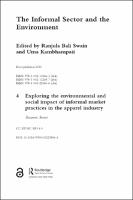Chapter 4 Exploring the environmental and social impact of informal market practices in the apparel industry
Proposal review
Abstract
This chapter explores global apparel consumption and its dependence on production supply chains in low-income countries where unsustainable and informal market practices are rampant. Recent life cycle studies of garments show that over 80 percent of environmental impact stems from the production phase of apparel. Up to 80 percent of this production is outsourced to the informal sector in developing countries. Besides the environmental impact, apparel manufacturing also affects sustainable development and includes many social issues related to poor working conditions and below living wages etc. Along with the growth of fast-fashion consumption, apparel production with its high dependence on low-income countries with coal-based energy sources, highly complex and untransparent industry structure with many tiers of suppliers, and the wide-spread use of informal market practices in the industry, is the reason why the environmental impact of the industry is accelerating rather than improving. Measures to mitigate the negative environmental and social impacts can spur a movement away from informal practices but can also risk moving informal practices further out in the tiers of the value chain and to domestic production, making such practices less transparent and the informally employed more vulnerable to lack of social security.
Keywords
economic incentive policies; environmental regulation; heterodox economics;inclusive growth ; informal economy; pollution abating equipment; pollution fees; sustainable development; Sustainable Development Goals; the green economyDOI
10.4324/9781003223856-4ISBN
978103212663, 9781032122687, 9781003223856Publisher
Taylor & FrancisPublisher website
https://taylorandfrancis.com/Publication date and place
2023Imprint
RoutledgeClassification
Development economics and emerging economies
Economics
International economics


 Download
Download